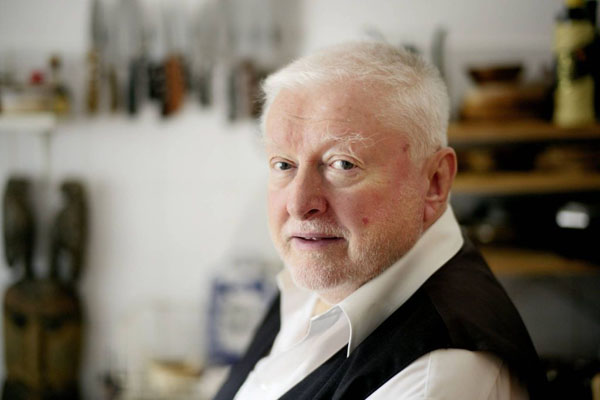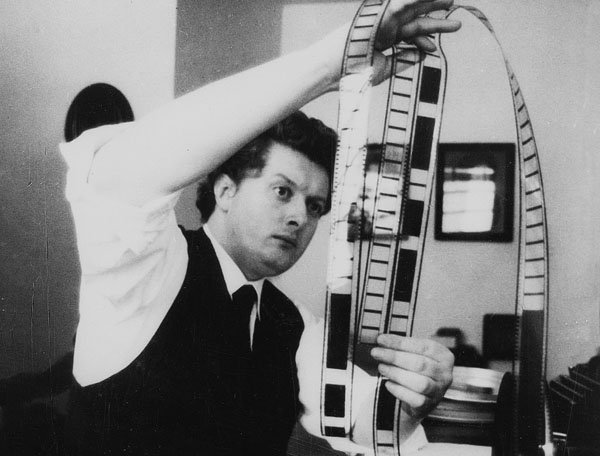Starting today, Peter Kubelka‘s 80th birthday, and on through April 9, the Austrian Film Museum in Vienna will be celebrating its co-founder (also a co-founder of New York’s Anthology Film Archives) with a series of screenings and lectures by and about this “true renaissance man: teacher, musician, cultural critic, collector of archaeological objects, Judoka and track athlete, theoretician and practitioner of the culinary arts—and one of the most important filmmakers of all time.”
The Museum’s also releasing Martina Kudláček’s four-hour documentary, Fragments of Kubelka (2012; site) on DVD for the first time. Michael Sicinski, writing here in Keyframe last April, has noted that “Fragments of Kubelka, as a work of digital video, is of necessity a translation of works and ideas that are as firmly steeped in the concrete language of celluloid as, say, architecture is grounded in the enclosure of space by rock, wood or steel. We are given something that the art of documentary allows us to receive, as a supplement to these films, a kind of movement or situation alongside them.” Since the 1950s, Kubelka “has in many ways set some of the fundamental terms for modernist experimentation in cinema, has produced a slender but powerful body of work: seven films total, plus a new work, Antiphon, based on a reversed score of his 1960 film Arnulf Rainer. Not counting Antiphon (or Monument, which is a projection-event of Antiphon and Arnulf Rainer shown together), Kubelka’s entire output to date can be screened in exactly 63 minutes.”
But what a potent hour. “I could say that in my case it was the concept of the single still frame as the basic unit for film art, which comes from Peter Kubelka—that really influenced me,” fellow Austrian filmmaker Peter Tscherkassky told Anna Tatarska earlier this year.
“Kubelka never lacks for words,” wrote Andrew Lampert last year, introducing “a radically reduced edit of a five-hour conversation” for the Brooklyn Rail “that touched on everything from café service in Vienna, pulling pranks on Theodor Adorno” and much more. In the second part of that conversation, Jonas Mekas joined in as the discussion wandered into “religion, Hitchcock, Judo, and Kim Il-sung’s predilection for ‘Danish films.'”
“Mekas has described Kubelka’s films as ‘crystalline’—as perfect as elemental matter,” wrote Stefan Grissemann in a profile for Film Comment in 2012:
In fact, Kubelka sees nature and art as inseparable—as both biological and cosmic. In analog cinema that is based on the rapid alternation of light and dark “you have the break of dawn and nightfall 24 times in each second.” Kubelka follows the principle of maximum reduction, but he wholeheartedly rejects terms like “experimental” or “avant-garde,” and insists he’s simply making “normal” films. “I never wanted to be radical, only consistent, like a scientist working toward his results. I am not intentionally radical.” Kubelka likes to compare film frames with musical notes; by composing images in series of 16, eight, six, and four he achieves regular harmonic rhythms that spectators can feel in their bones. “The atomos in Greek is the smallest unit, the indivisible—and cinema’s atomos is the single frame. My personal splitting the atom has been to perceive film not as motion but as a quick succession of static units. Arnulf Rainer developed out of a longing for the ‘now’-experience. The ecstasy it induces is the result of concentrating those now-moments.” Cycles and repetitions, he maintains, are the key to our existence. “Time doesn’t exist: we create it by breathing, walking, making love. As a filmmaker if you wish to create your own time, you need tools and machines: the film strip, scissors, and a projector.”
“[T]he world was not always what we see today,” Kubelka told Georgia Korossi in an interview for the BFI last year. “We now see different things to what our ancestors saw. This is mainly due to the media. And cinema, which has a history of over 100 years, has been inscribed into our lives so it will not vanish.”
More on Kubelka: Amy Budd (Lux) and Michael Metzger (Idiom). And two more interviews: Pamela Jahn (Electric Sheep) and Offscreen (2005).
For news and tips throughout the day every day, follow @KeyframeDaily on Twitter and/or the RSS feed. Get Keyframe Daily in your inbox by signing in at fandor.com/daily.





